
As a holder of the Deep Learning for Medical Analysis certification from NVIDIA DLI, I have gained comprehensive knowledge in applying deep learning techniques to radiology and medical imaging. This workshop equipped me with the skills to perform image segmentation, train convolutional neural networks (CNNs), and utilize radiomics to identify the genomics of a disease. I now understand how to effectively use deep learning for healthcare image analysis.
My capabilities include training CNNs to infer the volume of the human heart's left ventricle from time-series MRI data and performing image segmentation on MRI images to accurately locate the left ventricle. I can also employ CNNs to detect heart disease and calculate ejection fractions by measuring the differences between diastole and systole. Furthermore, I am proficient in applying CNNs to MRI scans of low-grade gliomas (LGGs) to determine the 1p/19q chromosome co-deletion status.
Throughout this workshop, I learned to place each pixel of an image into a specific class by extending Caffe with custom Python layers, implementing transfer learning, and creating fully convolutional neural networks from popular image classification networks. I also mastered leveraging CNNs for medical image analysis to infer patient status from non-visible images, which involved extending canonical 2D CNNs to more complex data, using the MXNet framework via Python API and R, and processing high-dimensional volumetric and temporal imagery. Additionally, I gained expertise in deep learning techniques for detecting imaging genomics (radiomics) from MRIs, including designing and training CNNs and using radiomics to create biomarkers that identify disease genomics without invasive biopsies, drawing insights from the radiogenomics work at the Mayo Clinic aimed at improving treatments and health outcomes for brain tumor patients.

